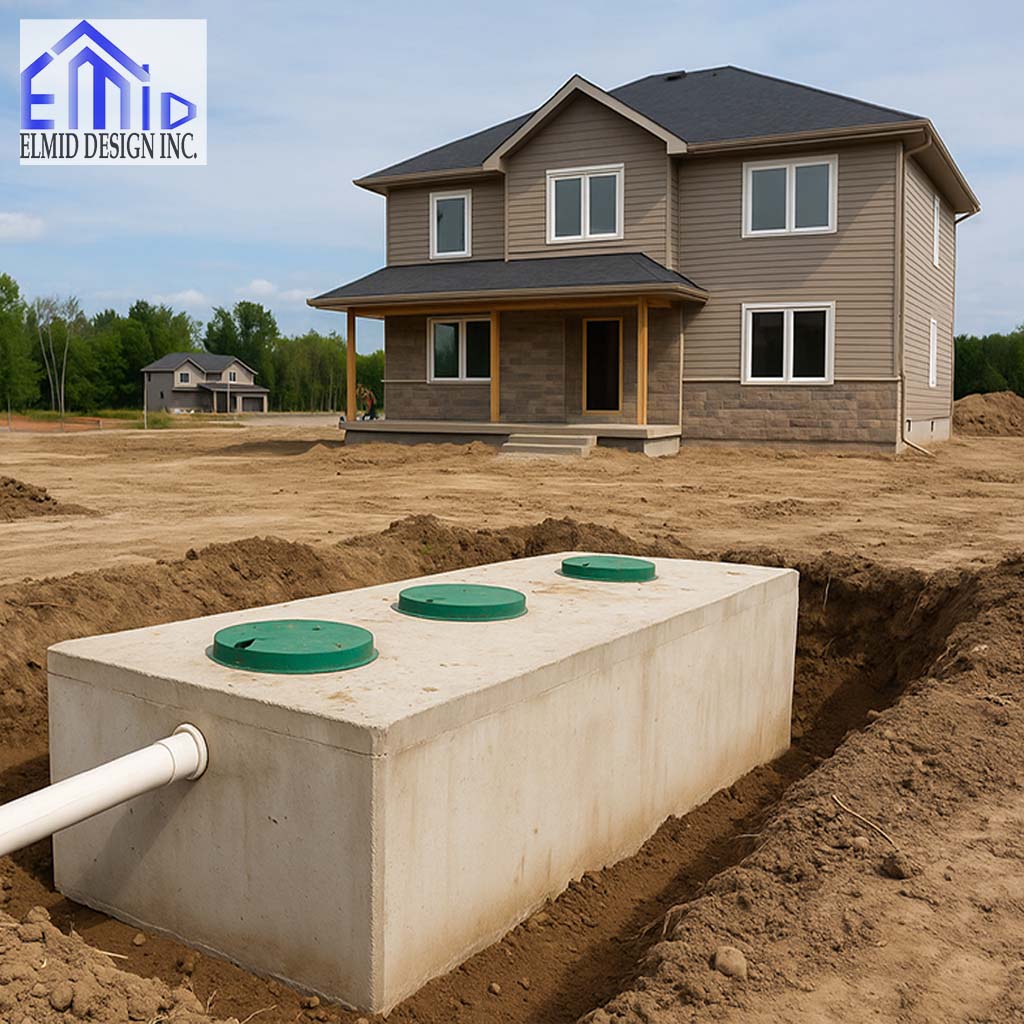Septic design in Mississauga requires precise planning and adherence to Ontario regulations to protect public health and the environment. In this article, you will understand how soil testing, septic sizing, municipal requirements, engineering expertise, and responsible installation combine to ensure a durable system. You will gain clear direction rooted in professional standards and local context.
Site Evaluation and Soil Testing
Every septic design begins with a careful site evaluation and soil testing in Mississauga. Engineers assess soil texture, percolation rates, water table depth, and bedrock proximity. These factors determine the appropriate septic system type. For example, sandy soil with low T‑time absorbs quickly, while clay with high T‑time may require alternate systems. Accurate evaluation ensures the system functions effectively and meets Ontario Building Code requirements.
Ontario Building Code and Regulatory Requirements
The Ontario Building Code governs septic systems under Part 8, addressing design, construction, operation, and maintenance on individual lots with flows up to 10 000 L per day. Misdesign, poor installation, or inadequate maintenance can lead to system failure. In Mississauga any septic design must comply with code and obtain municipal permits through the Building Department.
Engineering Oversight and Site‑Specific Design
A qualified professional engineer is central to successful septic design in Mississauga. They interpret soil tests, determine sewage flow rates, size septic tanks, and design drain or tile bed layouts. Their expertise ensures code compliance, functional durability, and long-term performance. Including the engineering firm Elmid Design Inc, with its PEO‑certified authorization, further supports credibility and E‑A‑T by demonstrating recognized professional oversight in the article.
Septic System Components Overview
A septic system consists of a septic tank and a leaching or drain field. The tank receives untreated sewage, allows solids to settle, and directs effluent to the drainage system. The drain field disperses the liquid into the soil. Proper design ensures sludge stays in the tank to protect the tile bed and maintain absorption efficiency.
Alternative Systems for Challenging Sites
When soil conditions are problematic—such as clay, shallow bedrock, or high water tables—conventional septic systems often struggle to function properly. As a result, alternative engineered systems like mound systems become necessary. In these cases, a mound system uses a dosing chamber to meter effluent into a sand-supplied mound. After that, the treated wastewater disperses into the soil beneath. Consequently, this approach improves filtration and reduces the risk of system failure. Therefore, mound systems offer a practical and effective solution for challenging sites where standard designs would not perform reliably.
Permit Process in Mississauga
Mississauga requires property owners to submit evaluated designs and forms as part of its development process. If a septic system exists on the site, you must provide documentation signed by a Qualified Person confirming proper decommissioning; these documents must comply before any development approval. Working closely with the city’s Building Department ensures a smooth permit review and approval process.
Installation and Construction Stages
Once the design secures approval, installation begins. Engineers transfer the plan to the field, followed by excavation for septic tanks and drain fields. During installation, elevation, alignment, and site contours are critical. Final inspections and tests—pressure, vacuum, and leak checks—occur before backfilling. These steps confirm proper system function and regulatory compliance.
Maintenance and Long‑Term Performance
After installation, regular maintenance ensures longevity. It involves periodic tank inspections and pump‑outs before solids build up and harm the drain field. Industry standards recommend inspection at least every two years, although frequency depends on household size and flow. Proactive care reduces contamination risks and maintains system health.
Cost Considerations for Mississauga
Septic system costs in Mississauga may range between CAD 5 000 and CAD 20 000 depending on site conditions and system complexity. Sandy soil and smaller houses may result in inexpensive systems, while large homes with tight clay soil require expensive engineered or tertiary systems. Early evaluation and accurate design help avoid cost overruns and adjust expectations.

Advanced Septic System Technologies
Mississauga has seen increasing interest in advanced septic technologies due to limited lot sizes and challenging soil conditions. These systems include tertiary treatment units, peat biofilters, and aerobic treatment units that enhance waste breakdown and reduce pathogens. Tertiary systems offer an additional layer of treatment and meet stricter environmental discharge criteria. Aerobic systems inject air into the treatment process to speed up decomposition and minimize odors. These technologies support smaller lot development and environmental sustainability. Proper engineering design ensures performance and full compliance with Ontario standards.
Environmental Impact and Groundwater Protection
A properly designed and maintained septic system protects the groundwater that many Mississauga homes depend on. Improper design or poor soil can lead to untreated sewage contaminating aquifers, leading to health risks and long-term environmental degradation. To reduce risks, professional assessments and ongoing inspections are necessary. Septic systems in environmentally sensitive areas near wetlands or bodies of water require more advanced filtration and effluent control. Engineers must confirm hydraulic loading rates to ensure minimal impact on surrounding water sources.
Role of Professional Engineers in Septic Design
A licensed professional engineer plays a central role in ensuring septic systems meet Mississauga’s technical and regulatory standards. Only professionals with credentials, such as a Certificate of Authorization from Professional Engineers Ontario, can submit legal septic design documents. Companies like Elmid Design Inc are authorized under PEO and experienced in providing compliant, efficient designs. Their work ensures your project avoids costly errors, delays, or failures. Engineering oversight also supports the credibility and authority of your development proposal under municipal and provincial review.
Septic Design for Residential Properties
Homeowners in Mississauga planning to build or renovate must ensure their septic design suits the site’s limitations and future usage. Flow rate calculations depend on bedroom counts, daily water use, and anticipated guest traffic. A family of five using modern plumbing fixtures has different septic demands than a couple in a cottage with seasonal use. Proper planning avoids system overload and premature drain field failure. Every design must balance user needs with long-term function, soil compatibility, and budget constraints.
Septic Design for Commercial and Rural Properties
Commercial sites such as banquet halls, motels, or rural offices require septic designs tailored to high or fluctuating flows. These systems often include grease traps, pump stations, or holding tanks to manage waste efficiently. Seasonal demand changes make accurate flow projections critical to performance. Designers work closely with owners to evaluate peak usage periods and align them with the septic system’s capacity. Professional engineers must size the system with enough buffer for surges without incurring unnecessary installation costs or complications.
Repairing and Replacing Failed Septic Systems
When septic systems fail, homeowners face a serious environmental and legal issue. Symptoms include slow drains, sewage odors, or wet patches in the yard. Engineers diagnose the root causes, which may include undersized tanks, clogged tiles, or poor soils. Sometimes repairs are possible with minor upgrades, but total system replacement may be necessary if the site no longer meets regulatory standards. The replacement design must comply with the most recent Ontario Building Code and be reviewed by the city before approval.
Timeline and Project Planning Considerations
A full septic design process in Mississauga takes several weeks, starting from the initial soil testing through final permit approval. Delays may occur due to weather, documentation issues, or permitting backlogs. Working with a professional engineer ensures accurate submission of all drawings, forms, and supporting calculations. Proactive clients who complete soil testing early reduce overall project timelines and avoid missed construction windows. The best time to begin septic planning is during preliminary site development to avoid future rework and delays.
Real Estate Impacts and Septic System Evaluation
Before purchasing a property in Mississauga with a septic system, buyers should conduct a septic inspection and review prior design approvals. If an older system is found, a qualified engineer can assess whether it meets current code and environmental requirements. Real estate agents may overlook this detail, yet it significantly impacts resale value and future development potential. Properties without documented septic approval or functioning systems may face permit rejections or high retrofit costs. Verification protects buyers from hidden liabilities.
Working With Municipal Review Boards
The City of Mississauga Building Department oversees septic permits and coordinates with Peel Public Health when necessary. Engineers communicate directly with review staff, providing designs, soil test results, and wastewater flow projections. Any discrepancies in design or compliance are resolved through formal responses or design modifications. Permit turnaround time improves when documentation is thorough and provided by experienced professionals. Applicants must remain responsive to municipal requests and allow engineers time to revise plans to secure timely permit approvals.
How Septic Design Impacts Site Development
Septic systems occupy substantial land area, and in Mississauga, their layout directly influences site grading, building placement, and landscaping. Setbacks from property lines, wells, and water bodies are non-negotiable under code. A system’s elevation must also align with the structure’s plumbing elevation to allow gravity flow. If space is limited, options may include compact systems or pumps, but those increase installation and maintenance complexity. Early septic design planning helps align zoning, grading, and structural plans to maximize land use.
Septic Design and Seasonal Water Table Changes
In Mississauga, seasonal fluctuations in the water table can drastically affect septic performance. Spring snowmelt or fall rainfall may raise the water table, reducing soil absorption and increasing the risk of saturated drain fields. This issue requires careful attention during system sizing and bed placement. Engineers analyze historical data and seasonal trends to ensure proper elevation and protection. Designs should factor in drainage, grading, and potential sub-drain installations to maintain consistent system function year-round.
Impact of Soil Texture on Septic System Selection
Soil texture determines how water drains and influences which type of septic system will perform efficiently. Sandy soils drain quickly but may not filter effectively, while clay holds water and causes pooling or failure. In Mississauga, engineers perform percolation tests and determine T-time to guide the right system choice. Slow-draining soils often require raised beds or tertiary systems. Matching system type with soil capacity helps prevent future repairs and ensures regulatory compliance from the start.
Septic Design Considerations for Waterfront Properties
Waterfront homes in Mississauga face stricter environmental and design regulations to protect lakes and groundwater. These lots demand advanced filtration, increased setbacks, and more compact systems to minimize impact. Engineers evaluate shoreline erosion risk and incorporate safeguards like tertiary treatment units or watertight tanks. Soil must support effluent absorption without runoff. In many cases, these homes require Ministry of Environment approvals beyond municipal permits. Failure to design carefully could result in permit denials or long-term contamination.
Coordination With Other Site Services
A septic design is never created in isolation. In Mississauga, septic layouts must coordinate with wells, stormwater infrastructure, driveways, and underground utilities. Engineers plan around these elements while maintaining the system’s functionality. For example, if a lot includes a well, the septic system must be placed downslope with sufficient horizontal separation. The design also accommodates future service access without disruption. This integrated planning ensures the entire development proceeds smoothly and avoids conflicts during construction or inspections.
Tables and Detailed Cost Breakdown
Septic system costs in Mississauga vary by site and system type. A basic conventional system costs between CAD 7,000 and CAD 12,000 depending on excavation depth and tank size. Raised bed systems start around CAD 12,000 and rise to CAD 18,000 or more with tertiary components. Engineering design and permit fees typically range from CAD 1,500 to CAD 3,000. Soil testing may add CAD 500 to CAD 1,000. Advanced systems with pumps, alarms, or filtration units raise costs but extend system life.
Septic Design Mistakes to Avoid
Common design mistakes in Mississauga include underestimating flow rates, neglecting seasonal soil changes, and ignoring site drainage. These errors lead to undersized systems, soil saturation, and eventual failure. Some homeowners bypass professional help and use generic templates, but this often leads to rejected permits. Others fail to consider long-term maintenance, leading to clogs and costly repairs. Engaging a qualified engineer early avoids these risks. A proper design saves money, ensures system longevity, and simplifies city approvals.
Why You Need a Professional for Septic Design
Attempting septic design without a licensed professional invites risk. In Mississauga, only PEO-authorized engineers like Elmid Design Inc can legally submit septic designs for building permits. Their knowledge of soil, hydraulics, and local bylaws prevents costly delays. Engineers also handle municipal correspondence, revise plans quickly, and provide technical justifications when needed. This professional representation increases approval speed and ensures legal protection. Without expert guidance, a homeowner may face project shutdowns or unexpected compliance issues.
Frequently Asked Questions
What permits do I need for a new septic system in Mississauga?
You need a building permit that includes soil test results, a septic design by a qualified engineer, and site grading information. In some cases, Peel Public Health and the Ministry of Environment may also review the application.
How do I know if my property can support a septic system?
You must complete a site evaluation and soil test to determine suitability. Engineers assess percolation rates and site layout before confirming the feasibility of installing a compliant system.
How often should I maintain or inspect my septic system?
Every system should be inspected every one to two years. Tanks may need pumping every three to five years depending on usage. Regular checks help prevent blockages and costly drain field damage.
What happens if my septic design gets rejected?
The engineer revises the design based on city feedback and resubmits the corrected version. Proper documentation, clear communication, and code-compliant revisions usually resolve rejections quickly.
Can I install a septic system myself?
No. In Mississauga, only licensed professionals with PEO authorization can design and submit septic plans for legal approval. Installation must follow these designs precisely to ensure performance and avoid violations.

Why Elmid Design Inc Is the Trusted Choice for Septic Design in Mississauga
Elmid Design Inc is a professional engineering firm with a Certificate of Authorization from Professional Engineers Ontario (PEO), specializing in septic system design across Mississauga. Our team delivers fully compliant, site-specific solutions tailored to Ontario Building Code requirements. With deep expertise in soil evaluation, hydraulic calculations, and municipal approvals, Elmid Design Inc ensures reliable septic designs that meet both residential and commercial needs. Clients trust our licensed engineers for fast, accurate service and long-term system performance.
Geographic Locations That We Service:
Our Licensed Professional Engineers specializing in Engineered Site Grading Plans offer the best-engineered site grading plan, lot grading and erosion plan, and drainage plan to obtain site plan approval and building permits in Ontario, including a wide range of municipalities. Each area boasts unique features and requirements, making our tailored approach essential for success.
Toronto and Surrounding Areas
In the vibrant heart of Ontario, we service Toronto (City of Toronto) and surrounding areas. Additionally, we cover Oshawa (City of Oshawa), Pickering (City of Pickering), and Clarington (Municipality of Clarington). Furthermore, our expertise extends to Ajax (Town of Ajax), Whitby (Town of Whitby), Brock (Township of Brock), Scugog (Township of Scugog), and Uxbridge (Township of Uxbridge).
Halton Region
Moving to the Halton Region, our services encompass Burlington (City of Burlington) and Halton Hills (Town of Halton Hills). Also included are Milton (Town of Milton) and Oakville (Town of Oakville).
Peel Region
In the Peel Region, we provide services in Brampton (City of Brampton), Mississauga (City of Mississauga), and Caledon (Town of Caledon).
York Region
Our services in the York Region cover Vaughan (City of Vaughan), Aurora (Town of Aurora), and East Gwillimbury (Town of East Gwillimbury). We also cater to Georgina (Town of Georgina), Markham (City of Markham), Newmarket (Town of Newmarket), Richmond Hill (City of Richmond Hill), Whitchurch-Stouffville (Town of Whitchurch-Stouffville), King (Township of King), and Bradford-West Gwillimbury (Town of Bradford-West Gwillimbury). Each municipality here offers a distinct setting, requiring our specialized approach.
Other Southern Ontario Cities and Towns
We also serve many other cities and towns in Southern Ontario. These include Hamilton (City of Hamilton), St. Catharines (City of St. Catharines), Niagara on the Lake (Town of Niagara on the Lake), Brant (County of Brant), Cambridge (City of Cambridge), Kitchener (City of Kitchener), Waterloo (City of Waterloo), and Woodstock (City of Woodstock). Furthermore, we operate in Guelph (City of Guelph), Centre Wellington (Township of Centre Wellington), Shelburne (Town of Shelburne), Orangeville (Town of Orangeville), New Tecumseth (Town of New Tecumseth), Essa (Town of Essa), Collingwood (Town of Collingwood), Wasaga Beach (Town of Wasaga Beach), Barrie (City of Barrie), Midland (Town of Midland), Orillia (City of Orillia), Ramara (Town of Ramara), Minden Hills (Town of Minden Hills), North Kawartha (Town of North Kawartha), Kawartha Lakes (City of Kawartha Lakes), Peterborough (City of Peterborough), Selwyn (Town of Selwyn), and Brighton (Municipality of Brighton).



